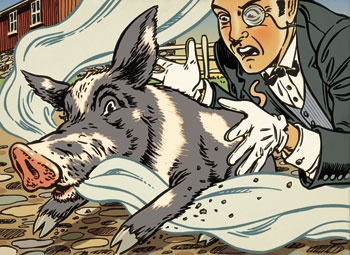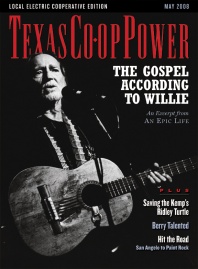French envoy Jean Pierre Isidore Alphonse Dubois was not impressed when he got his first look at the small town of Austin, new capital of the Republic of Texas, in 1840. He found the streets dusty, the buildings primitive and the climate unpleasant. Not at all like the magnificence of Paris.
Dubois, an ambitious young secretary from the French Legation in Washington, D.C., was sent to determine whether France should recognize the government of the new republic. It didn’t take him long to see the potential for financial gain for France and to get himself appointed chargé d’affaires.
The common-born Dubois decided that his name wasn’t impressive enough for his new position. He added “Count de Saligny” at the end of his signature.
Immediately after his arrival in Austin, things began to go south for Dubois. The teamster who had hauled his possessions to Austin presented him with a bill for $300. Dubois paid with counterfeit money.
Dubois took lodging at Bullock House, the only hotel in Austin. Owned by Richard Bullock, a rough-hewn frontiersman from Tennessee, the inn was actually a group of log buildings with handmade pioneer furniture. It was not at all to Dubois’ liking. He left without paying the bill.
Harsh words were exchanged between Bullock and Dubois. Bullock, given to crude expression, hurled verbal assaults so abusive that Dubois appealed to the Texas government to pass a law against “speaking in disrespectful terms of any foreign minister accredited to the government.” The law was passed, but it did not temper Bullock’s tongue.
In time, Dubois purchased land in Austin for the French government and hired workers to build an elaborate mansion to house the French Legation. As the mansion grew on the bare Austin skyline, Dubois lobbied to pass a piece of legislation called the Franco-Texian Bill, which would allow 8,000 French families to settle on 3 million acres in Texas.
Some Austin residents began referring to Dubois as the “No-Count de Saligny.”
The low point of Dubois’ stay in Austin was an international tempest in a teapot known as The Pig War.
The “wretched wood shanty” that Dubois eventually rented was a mere three blocks down Pecan Street (now Sixth Street) from Bullock House, where Bullock kept hogs that wandered town at will.
The pigs soon discovered that Dubois’ horses were fed corn every morning, and it didn’t take them long to break through a section of fence and join in the feast. Dubois had his butler run them off and repair the fence, but the next morning they were back. The pig raids continued, and the animals even penetrated Dubois’ house, munched on his linens and trampled his papers.
In a fit of rage, Dubois ordered his butler to kill the pigs, and shortly thereafter, the war broke out. Bullock attacked Dubois’ butler in the street on February 19, 1841. After a brief scuffle, Bullock chased the butler down the street, throwing rocks at him and threatening him with an ax.
By spring, the news of The Pig War had spread across Texas. Newspapers loved the story of the haughty little Frenchman. An editorial in the San Augustine Journal and Advertiser ended with the words, “Viva La Pigs.” Treasury Secretary John Gordon Chalmers stated uncharitably that he thought Bullock should have pulled out a gun and shot the uppity Frenchman.
His government recalled the No-Count de Saligny when the Republic of Texas joined the United States in 1846. His mission to Texas had been a total failure. The Franco-Texian Bill was never passed.
The graceful mansion of the French Legation long outlived its first resident and still looks out on the city of Austin from its hilltop on San Marcos Street east of Interstate 35. The last building left in the city from the young Republic of Texas and the oldest building in Austin was acquired by the State of Texas and now houses the French Legation Museum.
——————–
Martha Deeringer lives on a farm in Coryell County and is a member of Heart of Texas Electric Co-op.


